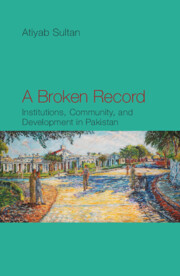Book contents
- Frontmatter
- Contents
- List of Figures
- List of Tables
- Preface
- Acknowledgements
- Introduction: Institutions, Debt, and the Deadweight of History, Punjab c. 1900–47
- 1 Glass Half Full?: Two Views of the Punjab
- 2 An Alternative Economic History of the Punjab
- 3 Combating Indebtedness I: Laws and Institutions
- 4 Combating Indebtedness II: Community Development in Colonial Punjab
- 5 The Bureaucrat’s Burden: Tales of Reform and Development
- 6 Colonialism and the Discourse on Development
- Postscript
- Glossary
- Bibliography
- Index
2 - An Alternative Economic History of the Punjab
Published online by Cambridge University Press: 27 September 2022
- Frontmatter
- Contents
- List of Figures
- List of Tables
- Preface
- Acknowledgements
- Introduction: Institutions, Debt, and the Deadweight of History, Punjab c. 1900–47
- 1 Glass Half Full?: Two Views of the Punjab
- 2 An Alternative Economic History of the Punjab
- 3 Combating Indebtedness I: Laws and Institutions
- 4 Combating Indebtedness II: Community Development in Colonial Punjab
- 5 The Bureaucrat’s Burden: Tales of Reform and Development
- 6 Colonialism and the Discourse on Development
- Postscript
- Glossary
- Bibliography
- Index
Summary
Ah, then again greed touched your greedy soul
And you began to fine us, a simple folk,
For every little thing, done or undone.
If ridges of a field were small,
Or if someone dug some mud to make a wall,
Or if the cattle yard was unclean,
Or if some water course was merely crooked,
There was a fine for each and everything.
Though fines unmentioned were in agreement,
The rule of Patwaris is hard to bear,
Their mouths we cannot sweeten everyday
They stop our cultivation, if we go
To see a friend, who happens to be ill
We are not school boys to ask for leave
For every little thing we wish to do
We have not taken voluntary exile
That we should never cross the bounds of Bar.
We undertook to cultivate the soil;
You cannot say that we failed in that.
More than our parents we have cherished you,
We thought you always good and kind,
We thought you wished us well and never will
Allow such things to happen very long
But is this true? We cannot think it is
That you are thinking of passing a law
To legalise the robbery of Ahalkars
And make that legal which was not before.
An alternative strategy for studying economic development in the Punjab is by examining the problem of indebtedness in relation to institutional change and economic reform. The Punjab was the richest province of colonial India, its breadbasket as well as the major recruiting ground for the Imperial army. For these reasons, the political and financial stability of the province were key objectives of the colonial state. Indebtedness in the province was also conceptualized by officials in a way that maintained the status quo and did not threaten the maintenance of law and order or the payment of land revenue. To the official mind, the chief economic issue for the Punjab peasantry was that of indebtedness. Not only did peasant indebtedness propel legal changes and administrative action but particular colonial officers also became heavily involved with initiating reforms to combat it. In some ways, indebtedness emerged from the commissioning of the range of property documents mentioned earlier that made land holdings in the Punjab assessable.
- Type
- Chapter
- Information
- A Broken RecordInstitutions, Community and Development in Pakistan, pp. 29 - 38Publisher: Cambridge University PressPrint publication year: 2022



